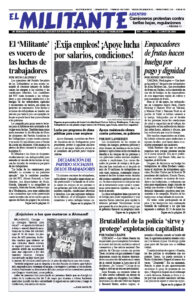A failed mercenary raid that unraveled on the shores of Venezuela May 3-4 became the latest blow to efforts of U.S.-backed Venezuela opposition leader Juan Guaidó to overthrow the country’s president Nicolás Maduro.
Launched from neighboring Colombia, the amphibious raid was dismantled by Venezuelan government forces and area fishermen soon after landing on the country’s coast near Caracas. It aimed at “removing the current regime and installing the recognized Venezuelan President Juan Guaidó,” according to a contract signed between Silvercorp USA and key figures in the pro-imperialist opposition.
The raiding party was comprised of 50 to 60 Venezuelan armed forces defectors and two former U.S. Army special forces veterans put together by the Florida-based “security” contractor.
Guaidó sought to deny his involvement in the planning and execution of the operation, but his signature was on the contract, designated as “commander in chief.”
The coup plotters sought to finance the operation by tapping wealthy U.S. capitalists and promising them access to bidding for Venezuela government contracts once Guaidó was in office. Silvercorp settled on $210 million to be paid from Venezuela’s future oil earnings.
With bipartisan support the Donald Trump administration has backed Guaidó, who proclaimed himself president in January 2019. He has led a series of failed attempts to provoke a military coup and uprisings to overthrow Maduro.
The opposition has been vociferous supporters of Washington’s trade and financial sanctions against Venezuela, which hit working people the hardest. It calls for further violations of Venezuela’s sovereignty by the U.S. rulers.
One crushing effect of U.S. sanctions that block oil exports and imports of chemicals and parts to run Venezuela’s refining industry is widespread gasoline shortages in the oil-rich country.
The botched coup took place after years of deepening capitalist crisis that has led to shortages of medicine, food and other basic necessities for working people, as well as soaring price rises. This worsened in April with inflation hitting 80%.
Since 2015 some 5 million of the country’s population of 30 million have fled these ruinous conditions to live abroad.
The current crisis is the result of the world capitalist downturn, accelerated by government lockdowns that followed the COVID-19 epidemic, and the impact of the U.S. rulers’ sanctions. But it’s also the result of the course of the Maduro government and his predecessor, Hugo Chávez, who sought to use profits from the country’s vast oil industry to fund welfare programs. They attempted to administer the capitalist market rather than organize working people to deepen their own struggles and fight for their interests against the capitalist rulers.
Washington denies involvement
U.S. government officials have denied direct involvement in the failed coup. “If we ever did anything with Venezuela it wouldn’t be that way,” said President Trump May 8, threatening, “It’d be called an invasion.”
The U.S. rulers, however, do have a long record of organizing coups in defense of their economic and political interests in the region and beyond — from the 1954 overthrow of Guatemala’s government of Jacobo Arbenz, to their role in the removal of President Manuel Zelaya in Honduras in 2009, to name just two.
The real target of U.S. imperialism is the workers and farmers of Venezuela.
Washington’s assaults on Venezuela are deeply tied to its decadeslong economic war against the Cuban Revolution. The Cuban government has over 20,000 medical and other volunteers in the country and receives some oil supplies from Caracas. The Trump administration has stepped up Washington’s sanctions against both Cuba and Venezuela. Democratic presidential hopeful Joe Biden has made it clear that if elected he would continue Washington’s sanctions on Cuba.

